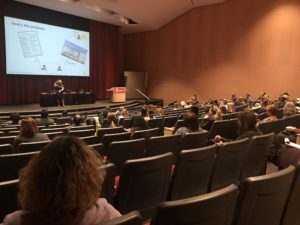In March, before the CDC discouraged large, in-person gatherings to slow the spread of COVID-19, the Indiana University Office of Research Compliance kicked off its Joint Public Lecture Series by collaborating with the Indiana Clinical and Translational Institute (CTSI) to host Heather Pierce, JD, MPH. Her lecture was titled, “Reducing Burden for Researchers and Advancing Research Ethics: Is It a Tradeoff?”

Heather Pierce, JD, MPH
Pierce is the Senior Director for Science Policy and Regulatory Counsel for the Association of American Medical Colleges, where she is the subject matter expert for issues related to the regulation of science and research, as well as interactions between industry, academia, and government. During her presentation, she said that advancing research ethics and reducing the burdens on researchers don’t have to be mutually exclusive efforts.
“As a country and as institutions, we can work to reduce administrative burden for researchers and research staff without sacrificing the imperative to advance ethical research, but it must be done thoughtfully and transparently,” said Pierce. “If we try to balance one against the other without also considering public perceptions, beliefs, and assumptions, we risk losing public trust. A strong foundation in research ethics is necessary – but not sufficient – to maintain public trust in research.”

Pierce raised questions about whether recent efforts to reduce the burdens of researchers could be in conflict with a growing emphasis on transparency. She brought up recent research scandals that happened at Memorial Sloan Kettering Cancer Center, Duke University and Harvard University. She said that even though these examples weren’t issues of research integrity, it’s important to be aware of the implications of these stories, since many people make decisions based on headlines they see and these kinds of research scandals can be very visible.
“This presentation was incredibly timely and has fostered deep discussions for both our leadership and research teams,” said Carmel Egan, PhD, Chief Operating Officer for the Indiana CTSI. “While our scientists strive to develop cutting-edge research, the Indiana CTSI is also balancing other priorities, such as cultivating public trust and making sure our administrative requirements are fulfilled.”
While it can be hard to comply with the demands of various kinds of regulation, Pierce encouraged researchers to remember best practices:
- Consider other perspectives
- Get the balance right
- Abide by statues, regulations, policies and processes
- Disclose conflicts of interest
- Keep your promises to trainees and collaborators
- Communicate
- Provide training and resources
- Establish safe and inclusive research environment
- Practice good data management
- Keep your promises to the public
- Communicate
- Explain what went wrong when something doesn’t go according to plan
“We need to find ways to talk about more than just the research breakthroughs, but also the research process,” said Pierce. “We need to ensure that what people read about breakthroughs comes from sources they trust, so that they know that the people and institutions that developed breakthroughs were doing research in ways that were really focused on ethical principles.”
The event took place in the Hine Hall auditorium.
